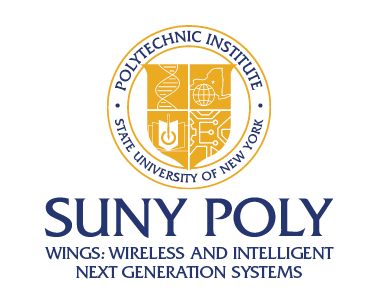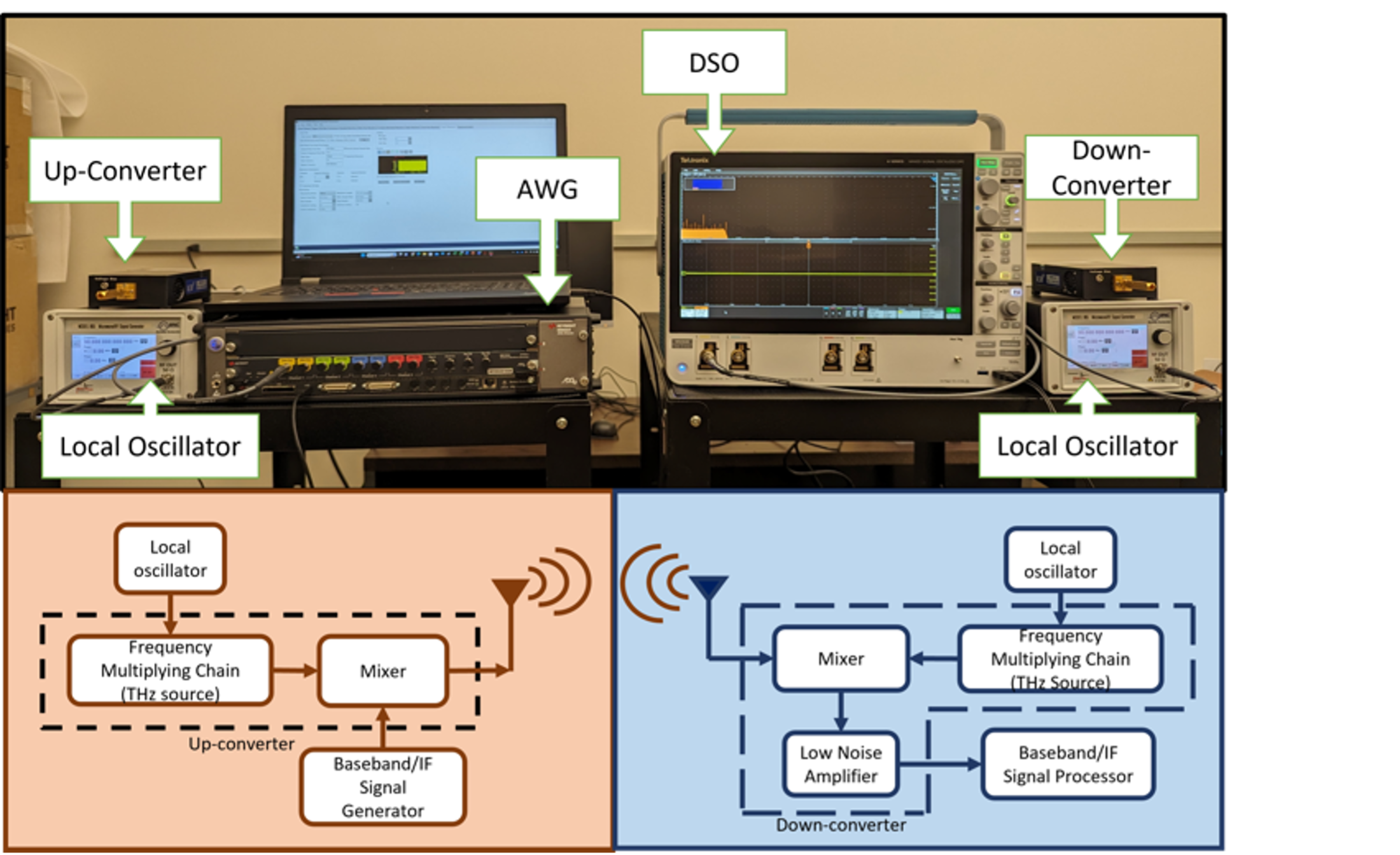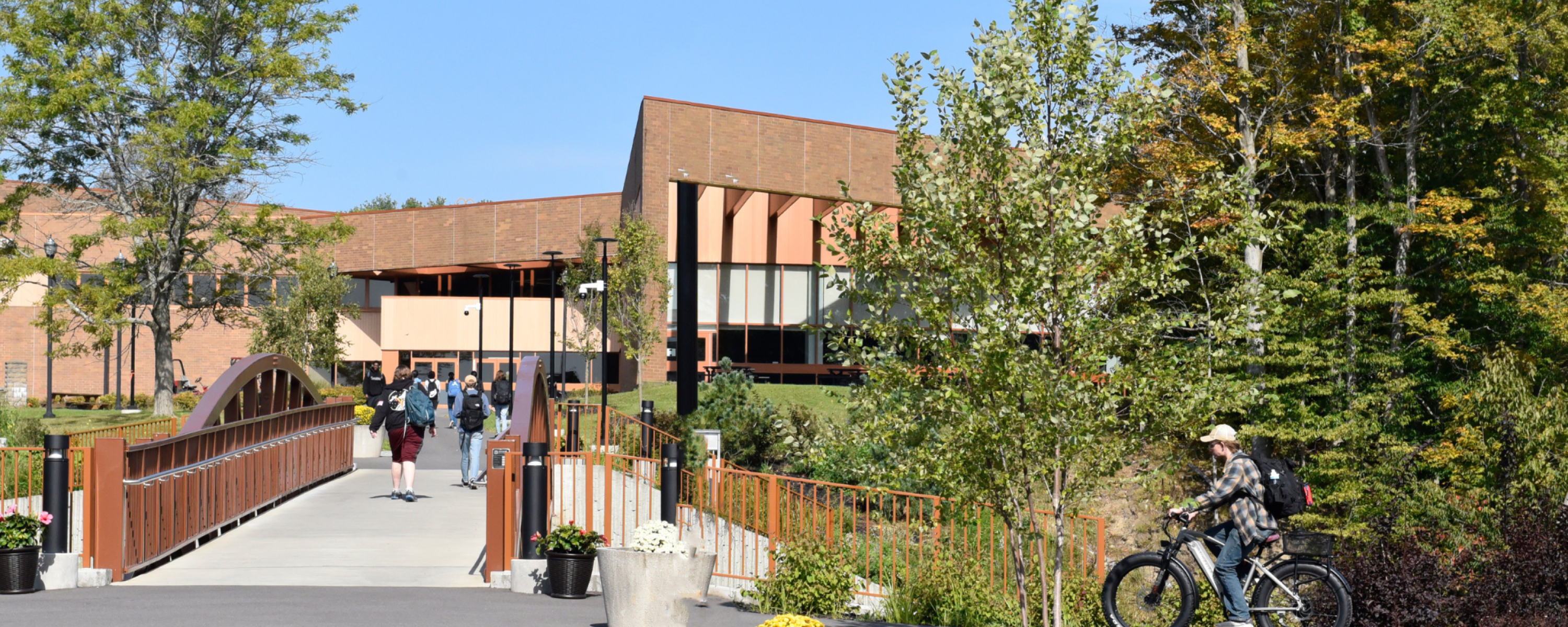WINGS Summary
The aim of the proposed wireless and intelligent next generation systems (WINGS) Center at SUNY Poly is to create a cross-disciplinary symposium of excellence in the domain of wireless technology. Involving SUNY Poly faculty from distinct disciplines, as well as external partners who are leaders in their fields, the center aims to be at the forefront of research, curriculum development, and policymaking by spearheading activities in academia, government, defense, and commercial landscapes. The goal of the center is to act as a self-sustaining entity that is acknowledged as a leader in the development, adoption, and direction of future generation of systems, driven by cutting-edge AI-brain engines, automation systems and wireless connectivity. The prime focus of the center is to spearhead THz communication systems, by adding in artificial intelligence and automation to increase the capabilities of today’s wireless systems. In addition, the center also focuses on nanoscale communications and inter/intrabody communications.
The center is in direct alignment with SUNY Poly’s strategic pillars pertaining to artificial intelligence and information technology, while also providing support for smart infrastructure, robotics, healthcare, and well-being. Furthermore, it is closely aligned with U.S. government agencies such as DARPA and AFRL, as well as industry initiatives that offer substantial research funding. The goals of the center are also aligned with six of the NSF’s Big 10 ideas: (1) Future of the work at the Human Technology Frontier; (2) Growing convergence research; (3) Harnessing the data revolution; (4) Mid-Scale Research Infrastructure; (5) NSF Includes; (6) Quantum Leap.
Research: Continuing and Proposed Work
Next-G Wireless Development: Co-PIs Sen, Sangwan, and Singh will work on realizing efficient solutions for next-generation wireless. The primary focus is on physical layer solutions for the sub-THz and THz bands, considering channel study, waveform, and wavefront engineering, ultra-secure link design, which are receiving significant attention from the research community and are expected to be at the forefront of wireless research for the coming two decades. The objective is to integrate these findings to facilitate the establishment of complex links through link adaptation using AI/ML, Tbps link setup, joint waveform and wavefront engineering, and joint communication and sensing. The advanced communications and sensing (ACES) testbed setup by Singh and Sen will be utilized for these purposes. Senior Personnel Sahoo is helping with RFSoC and PAPR reduction capabilities.

ACES Testbed at SUNY Poly
Secure Communications: Wireless security is an essential element of next-G communication systems. Co-PI Medley has previously been involved in cross-layer security waveforms which have wide-ranging applications. In addition, PI Singh, Sen, and Medley continue to explore ultra-broadband waveform designs which can be designed without sacrificing on the data rate requirement in the THz band. In addition, physical layer security by avoiding eavesdroppers and jammers through beamforming becomes practical in the sub-THz and THz domains. In addition, Senior Personnel Saha has worked on ML-based noise-like waveforms. The PIs continue to build on this complementary work, developing a cross-layer security prospect.
Nano-bio Sensing and Communication: Co-PIs Sangwan and Sen will be working on creating a test-bed to adapt and leverage the expertise of ultrahigh-frequency wireless communications for the nanoscale communications and sensing testbed. The testbed will feature a platform to develop and test advanced waveforms and technologies for the nano-bio applications of state-of-the-art electromagnetic communications and plasmonic sensing for interbody networks and medical applications. At SUNY Poly, we are uniquely positioned to develop the designs and fabricate some of the early prototypes of the devices targeting these applications, and the testbed will facilitate these activities. The testbed will also enable student training programs related to technology miniaturization and skill developments in creating robust electrical hardware designs within the emerging field of Biomed applications.
Artificial Intelligence Use Cases: The availability of the ACES testbed allows the generation of large experimental data-sets, crucial for AI advances such as deep learning and back-propagation to become useful. Already, Ryan Primus and Zachary Smith of the computer science department are working on data-sets to create solutions for physical layer problems such as phase noise and waveform modulation. PI Zaman brings expertise in NLP and ML analysis which will help us to generate strong, authentic, and valid use cases of AI-uses in the future wireless landscape.
Automation: Co-PI Zhou is helping guide the plan for building fully automated capability within the ACES testbed. This will help the testbed to be remotely controllable, thus helping SUNY Poly provide the world's first remotely accessible THz testbed. The automated testbed will ultimately be made available for researchers in the partner institutions as well as for remote access to under-serviced institutions, including KNUST.
Research Professionals
Arjun Singh, ECE (PI)
Assistant Professor
singha8@sunypoly.edu
Arjun Singh (Member, IEEE) received the B.S. summa cum laude, and M.S. in Electrical Engineering from the University at Buffalo, The State University of New York, NY, USA, in 2016 and 2018, respectively. He obtained his Ph.D. in Electrical Engineering from Northeastern University, Boston, USA in December, 2021. Since 2022, he is an Assistant Professor in the Department of Engineering at the State University of New York Polytechnic Institute, Utica, NY. He has successfully led to the development of the THz research program at SUNY Poly, by supervising the purchase of over $500,000 in equipment for setting up the Advanced Communications, Electronics and Sensing testbed, which is a state-of-the-art testbed for THz communications. He has also secured external funding from AFRL and NSF, and is engaged in regular proposals to the NSF, both individual as well as collaborative. His successful work in teaching has also been recognized by the department through the Dean's award in teaching excellence in 2023.
His research interests include realizing Terahertz-band wireless communications, dynamic spectrum sharing, space networks, wavefront engineering, graphene-plasmonics and intelligent reflecting surfaces. In these areas, he has coauthored several publications in leading journals, as well as 1 US patent. He is also serving as the media chair for the IEEE RCC Special Interest Group on Terahertz Communications and as a reviewer for reputed journals including IEEE communications magazine.
At SUNY Poly, he has been serving as a co-chair of the IEEE Club, which has gained Wildcat status under his mentorship. The students from the IEEE Club have successfully published in high impact international conferences, becomes RAs, and are engaged in research and community outreach effort. He is also a member of the SUNY Poly AI Task force, where he has been working on the technical side by addressing the potential of AI in wireless solutions. He is also a regular representative of the ECE department at the accepted students day and outreach activities.
Priyangshu Sen
Assistant Professor of Electrical and Computer Engineering
senp@sunypoly.edu
Priyangshu Sen is an Assistant Professor in the Department of Engineering, at SUNY Polytechnic Institute. He received his Bachelor of Technology degree from Biju Patnaik University of Technology, India, in 2012. He completed his industrial training in Garden Reach Shipbuilders and Engineers Limited on the communication system on a naval board ship, in 2011. He started his career as a research engineer at the University of Calcutta in Radio Physics and Electronics, in 2013. He received his Master of Technology degree in Radio Physics and Electronics from the University of Calcutta, India, in 2015. He completed his summer training at Samsung Research America in the sub-terahertz communication system and protocol design, in 2019. Recently, he received his Ph.D. degree from the Department of Electrical and Computer Engineering, Northeastern University, Boston, MA, USA, in 2022, under the guidance of Professor Josep M. Jornet in the UN Lab, Boston, MA, USA. His current research interests include experimental and statistical characterization of terahertz communication channels and networks. He worked as a wireless system development engineer at Amazon in the USA from 2022 to 2023.
At SUNY Poly, he is the designated point of contact for wireless communication and progress with KNUST representatives. He also streamlined the development of the ACES laboratory and set up the versatile wireless testbed at THz and mmWave frequencies. Further, he has created a software-defined backbone for the system which has greatly facilitated research, collaboration and funding opportunities. He obtained external funding through AFRL-mid Atlantic solicitation to lead the channel measurement effort at THz frequencies.
Michael Medley
Assistant Professor
michael.medley@sunypoly.edu
Michael J. Medley received the Ph.D. degree in electrical engineering, in 1995, from Rensselaer Polytechnic Institute, Troy, NY, USA, where he previously was awarded B.S. and M.S. degrees in electrical engineering, in 1990 and 1991. He currently serves as an Associate Professor of Electrical and Computer Engineering at the State University of New York Institute of Technology (SUNYIT) as well as Senior Research Engineer at the United States Air Force Research Laboratory (AFRL). Since 1991, he has been involved in AFRL communications and signal processing research related to adaptive interference suppression, spread spectrum waveform design, covert messaging, and airborne networking and communications links. Since joining SUNYIT in 2002, he has been responsible for the development of the electrical and computer engineering program and continues to actively pursue research and development related to software defined radios, cognitive radio networking and engineering education. In 2012, Prof. Medley received the IEEE Region I Outstanding Teaching Award for the development of an undergraduate electrical and computer engineering program in the Mohawk Valley.
Amit Sangwan, ECE (Co-PI)
Assistant Professor
sangwaa@sunypoly.edu
Amit Sangwan received his Bachelor of Technology in Electronics and Communication Engineering degree from Guru Jambheshwar University of Science and Technology, Hisar, Haryana, India, in 2013. He received his Master of Science degree in Electrical Engineering from the University at Buffalo, The State University of New York, Buffalo, NY, USA, in 2017 and his Ph.D. degree at the Department of Electrical and Computer Engineering at Northeastern University, Boston, USA under the guidance of Dr. Josep M. Jornet. He worked as a Research and Development Engineer at an innovative start-up company in India from August 2013 to June 2015. He was a visiting researcher at MERL (Mitsubishi Electric Research Labs), Boston, MA, in 2018. He worked for Bionet Sonar on Biomedical device research from 2022 to 2024. He will join as an assistant professor at SUNY Poly, Utica, in 2024. His research interests include IoT (Internet of Things), nano-sensor networks, nano-optical antennas, beamforming arrays, ultra-broadband communications, nanophotonic systems, wireless optical communication, and bio-nano implant communications.
Tarannum Shaila Zaman
Assistant Professor
zamant@sunypoly.edu
Tarannum Shaila Zaman, is an Assistant Professor in the Department of Computer Science, at SUNY Polytechnic Institute. She earned her Ph.D. in Computer Science from the University of Kentucky in 2022. Her advisor is Dr. Tingting Yu. She earned her MS and BSc. degree in Computer Science from the University of Dhaka in 2013 and 2011 respectively. Her research interests lie in developing novel techniques that make modern software systems more autonomous, secure, efficient, reliable, and user-friendly by using Data Mining, Machine Learning, Natural Language Processing, Information Retrieval, and Program analysis techniques. She is currently working in the graduate council of SUNY Poly and has made significant contributions to the development of the college’s graduate curriculum. She has also designed, developed, and conducted three special topic courses, including Data Mining in Software Engineering, for graduate students in the computer science department at SUNY Poly. Furthermore, she is working to cultivate a sense of belonging, particularly for women and underrepresented groups in STEM. In 2020, she was awarded the “Pillar Award for Belonging and Engagement” by the Graduate Student Congress of the University of Kentucky. She also served as a student volunteer in FSE 2017 and ASE 2019.
Yu Zhou
Associate Professor
zhouy2@sunypoly.edu
Yu Zhou is an associate professor of Mechanical Engineering at SUNY Polytechnic Institute. He earned his Ph.D. in Mechanical Engineering from The Johns Hopkins University in 2004. He also served as a Postdoctoral Fellow in Robotics at The Johns Hopkins University from 2004 to 2005 and worked as an Assistant Professor in the Department of Mechanical Engineering at the State University of New York at Stony Brook (SBU) from 2005 to 2013. His current research interests include the coordination and control of networked multi-robot systems and cyber-physical systems, robotic manufacturing, kinematic/dynamic modeling and control of robots and other dynamic systems under constraints and uncertainties, artificial intelligence and machine learning, mobile robot localization and navigation, robotic and sensing technologies for surgical, assistive, and rehabilitative applications, as well as robotic and sensing technologies to enhance the efficiency and reliability of energy utilization, signal and image processing, among others.
Bibhudutta Sahoo, University at Buffalo (Senior Personnel)
Assistant Professor
Bibhu Datta Sahoo received the B.Tech. degree in electrical engineering from IIT Kharagpur, Kharagpur, India, in 1998, the M.S.E.E. degree from the University of Minnesota, Minneapolis, MN, USA, in 2000, and the Ph.D.E.E. degree from the University of California at Los Angeles, Los Angeles, CA, USA, in 2009. From 2000 to 2006, he was at the DSP Microelectronics Group, Broadcom Corporation, Irvine, CA, USA, where he designed analog and digital integrated circuits for signal-processing applications. From December 2008 to February 2010, he was at Maxlinear Inc., Carlsbad, CA, USA, where he was involved in designing integrated circuits for CMOS television (TV) tuners. From March 2010 to November 2010, he was a Postdoctoral Researcher at the University of California at Los Angeles. From December 2010 to December 2011, he was an Assistant Professor at the Department of Electronics and Electrical Communication Engineering, IIT Kharagpur. From December 2011 to April 2015, he was an Associate Professor at the Department of Electronics and Communication Engineering, Amrita University, Amritapuri, India. From January 2016 to April 2017, he was on sabbattical from Amrita University and a Research Scientist at the University of Illinois at Urbana–Champaign, Champaign, IL, USA. Since August 2017, he has been an Associate Professor at the Department of Electronics and Electrical Communication Engineering, IIT Kharagpur. His current research interests include data converters, signal processing, and analog and mixed-signal circuit design. Dr. Sahoo received the 2008 Analog Devices Outstanding Student Designer Award. He was a co-recipient of the 2013 Custom Integrated Circuits Conference (CICC) Best Paper Award. He was an Associate Editor of the IEEE Transactions on Circuits and Systems—Part II: Express Briefs from August 2014 to December 2015.
Dola Saha, University at Albany (Senior Personnel)
Assistant Professor
Dola Saha received the master’s and Doctoral degrees from the Department of Computer Science, University of Colorado Boulder. She is an Associate Professor with the Department of Electrical and Computer Engineering, University at Albany, SUNY, where she co-directs the Mobile Emerging Systems and Applications Laboratory. She was a Faculty Fellow with Jet Propulsion Laboratory, Caltech, NASA in Summer 2022. She was a Visiting Faculty with the Air Force Research Laboratory in Summer 2020 and 2021. She is the Vice Chair of the IEEE ComSoc TCCN SIG for AI and Machine Learning in Security and has been appointed a member of the SUNY Innovations Policy Board. Prior to that, she was a Research Assistant Professor with the Department of Electrical and Computer Engineering, Rutgers University. Before that, she was a Researcher with the Mobile Communications and Networking Group, NEC Laboratories America. Dr. Saha’s research lies in the crossroads of Wireless Communication, Wireless Signal Processing, Machine Learning in Wireless Communication, Wireless Networks and Architecture of Software Defined Radios with focus on systems design and practical evaluation. These include areas such as Cloud RAN, Drone Communication, IoT, 5G and Beyond Wireless Communication, Coexistence of Networks, Localization. She has research interests in: Machine Learning for Wireless Communication and Signal Processing, Coexistence of Communication and Passive Users like Radio Astronomy, TeraHertz Communication, Wireless Security.


